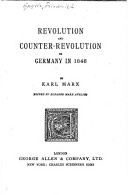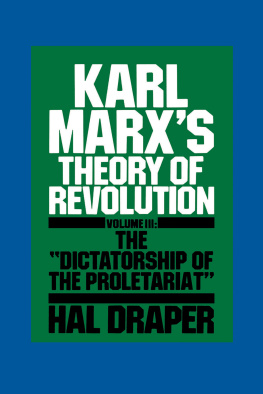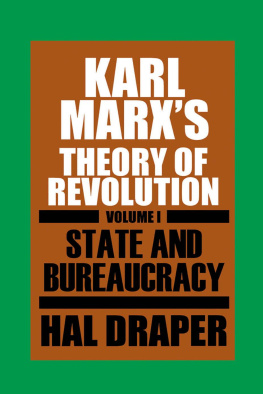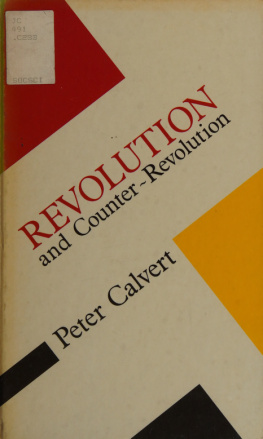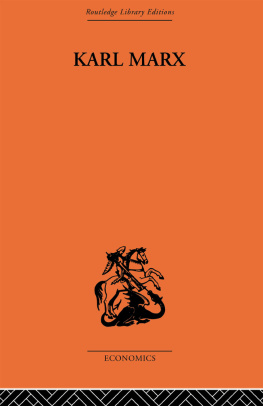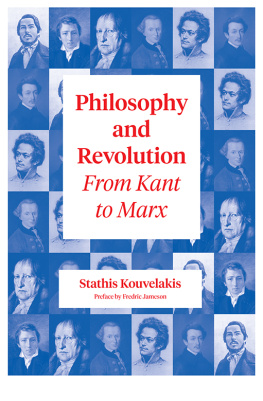Karl Heinrich Marx - Revolution and Counter-Revolution : or, Germany in 1848
Here you can read online Karl Heinrich Marx - Revolution and Counter-Revolution : or, Germany in 1848 full text of the book (entire story) in english for free. Download pdf and epub, get meaning, cover and reviews about this ebook. year: 1912, genre: Politics. Description of the work, (preface) as well as reviews are available. Best literature library LitArk.com created for fans of good reading and offers a wide selection of genres:
Romance novel
Science fiction
Adventure
Detective
Science
History
Home and family
Prose
Art
Politics
Computer
Non-fiction
Religion
Business
Children
Humor
Choose a favorite category and find really read worthwhile books. Enjoy immersion in the world of imagination, feel the emotions of the characters or learn something new for yourself, make an fascinating discovery.
- Book:Revolution and Counter-Revolution : or, Germany in 1848
- Author:
- Genre:
- Year:1912
- Rating:3 / 5
- Favourites:Add to favourites
- Your mark:
- 60
- 1
- 2
- 3
- 4
- 5
Revolution and Counter-Revolution : or, Germany in 1848: summary, description and annotation
We offer to read an annotation, description, summary or preface (depends on what the author of the book "Revolution and Counter-Revolution : or, Germany in 1848" wrote himself). If you haven't found the necessary information about the book — write in the comments, we will try to find it.
Revolution and Counter-Revolution : or, Germany in 1848 — read online for free the complete book (whole text) full work
Below is the text of the book, divided by pages. System saving the place of the last page read, allows you to conveniently read the book "Revolution and Counter-Revolution : or, Germany in 1848" online for free, without having to search again every time where you left off. Put a bookmark, and you can go to the page where you finished reading at any time.
Font size:
Interval:
Bookmark:
Karl Heinrich Marx

All Your Books Are Belong To Us !
http://c3jemx2ube5v5zpg.onion
or, Germany in 1848
Copyright 1912 Karl Heinrich Marx
Edited by ELEANOR MARX AVELING
The following articles are now, after forty-five years, for the first time collected and printed in book form. They are an invaluable pendant to Marx's work on the coup d'tat of Napoleon III. ("Der Achtzehnte Brumaire des Louis Bonaparte.") Both works belong to the same period, and both are what Engels calls "excellent specimens of that marvellous gift ... of Marx ... of apprehending clearly the character, the significance, and the necessary consequences of great historical events at a time when these events are actually in course of taking place, or are only just completed."
Mr. C. A. Dana was at this time still in sympathy with Socialism. The effects of Brook Farm had not yet worn off.
"Herr Vogt," pp. 59 and 185. London, 1860.
Including Bruno Bauer, Bayard Taylor, Ripley, and many of the Brook Farmers. The editor was Horace Greeley.
The "eleven men" were: Dupont de l'Eure, Lamartine, Crmieux, Aarago, Ledru Rollin, Garnier-Pages, Marrast, Clocon, Louis Blanc, and Albert.
The "Zollverein" was the German Customs Union. It was originally founded in 1827, and largely extended after the war of 1866. Since the unification of Germany as an "Empire" in 1871, the States belonging to the Zollverein have been included in the German Empire. The object of the Zollverein was to obtain a uniform rate of customs duties all over Germany.
"The Rhenish Gazette." This paper was published at Cologne, as the organ of the Liberal leaders, Hansemann and Camphausen. Marx contributed certain articles on the Landtag, which created so great a sensation that he was offered in 1842although only 24 years of agethe editorship of the paper. He accepted the offer, and then began his long fight with the Prussian Government. Of course the paper was published under the supervision of a censor, but he, good, easy man, was hopelessly outwitted by the young firebrand. So the Government sent a second "special" censor from Berlin, but the double censorship proved unequal to the task, and in 1843 the paper was suppressed.
Lusiana, an ancient territory of Germany, north of Bohemia, to which the whole of it originally belonged. Later it belonged to Saxony, and still later, in 1815, was divided between Saxony (the northern part) and Prussia (the southern).
"Die Neue Rheinische Zeitung" (The New Rhenish Gazette). After the March revolution, 1848, Marx returned from Paris to Germany, and settling downfor the time beingat Cologne, founded this paper. Although the "Neue Rheinische Zeitung" never went in for propounding "Communist schemes," as Mr. Dawson, e.g., says it did, it became a very nightmare to the Government. Reactionaries and Liberals alike denounced the "Gazette," especially after Marx's brilliant defence of the Paris Insurrection of June. The state of siege being declared in Cologne, the "Gazette" was suspended for six weeksonly to appear with a bigger reputation and bigger circulation than before. After the Prussian "coup d'tat" in November, the "Gazette" published at the head of every issue an appeal to the people to refuse to pay taxes, and to meet force by force. For this and certain other articles the paper was twice prosecuted. On the first occasion the accused were Marx, Engels, and Korff; on the second and more important trial, they were Marx, Schapper, and Schneider. The accused were charged with "inciting the people to armed resistance against the Government and its officials." Marx mainly conducted the defence, and delivered a brilliant speech. "Marx refrains" (in this speech) "from all oratorical flourish; he goes straight to the point, and without any peroration ends with a summary of the political situation. Anyone would think that Marx's own personality was to deliver a political lecture to the jury. And, in fact, at the end of the trial, one of the jurors went to Marx to thank him, in the name of his colleagues, for the instructive lecture he had given them." (See Bernstein's work, "Ferdinand Lassalle.") The accused were unanimously acquitted by the jury. Among the better known of the contributors of the "New Rhenish Gazette," edited by Marx, were Engels, W. Wolff, Werth, Lassalle; while Freiligrath wrote for it his splendid revolutionary poems. Perhaps one of the grandest of these is the celebrated "Farewell of the 'Rhenish Gazette'," when on the 19th May, 1849, the final number of the papersuppressed by the Governmentappeared, printed in red type.
"When the last of crowns like glass shall break,
On the scene our sorrows have haunted,
And the people the last dread 'Guilty' shall speak,
By your side ye shall find me undaunted.
On Rhine or on Danube, in word and deed,
You shall witness, true to his vow,
On the wrecks of thrones, in the midst of the freed
The rebel who greets you now."
(Translated by Ernest Jones.)
The "Wolff" here alluded to is Wilhelm Wolff, the beloved friend of Marx and Engels, whoto distinguish him from the many other "Wolffs" in the movement at this periodwas known to his intimates as "Lupus." It is to this Silesian peasant that Marx dedicated the first volume of "Capital."
"Dedicated
To My Never-To-Be-Forgotten Friend
The Brave, True, Noble Fighter In The Van-Guard
Of The Proletariat,
WILHELM WOLFF.
Born at Tornau, June 21st, 1809. Died in exile at Manchester, 9th May, 1864."
After repeated search I have been unable to find the "next letter" referred to in the above paragraph; and, if it was ever written, there seems no doubt it was never published.E. M. A.
"The Manifesto." This is the celebrated "Communist Manifesto," which the Communist Congress, held in London, November, 1847, delegated Marx and Engels to draw up. It was published in 1848 (in London). The fundamental proposition of the Manifesto, Engels writes in his introduction to the "Communist Manifesto," translated by S. Moore, and published by W. Reeves, "is that in every historical epoch, the prevailing mode of economic production and exchange, and the social organization necessarily following from it, form the basis upon which is built up, and from which alone can be explained, the political and intellectual history of that epoch; that consequently the whole history of mankind has been a history of class struggles, contests between exploiting and exploited, ruling and oppressed classes; that nowadays a stage has been reached where the exploited and oppressed classthe proletariatcannot attain its emancipation ... without at the same time, and once and for all emancipating society at large from all exploitation, oppression, class distinctions, and class struggles." As to this fundamental proposition of the Manifesto, it "belongs," says Engels, "wholly and solely to Marx." The "Communist Manifesto" has been translated into well-nigh every language, and is, again to quote Engels, "the most international production of all Socialist literature."
Font size:
Interval:
Bookmark:
Similar books «Revolution and Counter-Revolution : or, Germany in 1848»
Look at similar books to Revolution and Counter-Revolution : or, Germany in 1848. We have selected literature similar in name and meaning in the hope of providing readers with more options to find new, interesting, not yet read works.
Discussion, reviews of the book Revolution and Counter-Revolution : or, Germany in 1848 and just readers' own opinions. Leave your comments, write what you think about the work, its meaning or the main characters. Specify what exactly you liked and what you didn't like, and why you think so.

